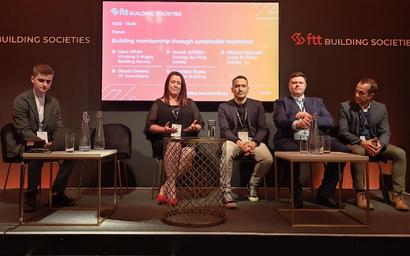Creating sustainable solutions by partnering with eco-centric fintech to build greener platforms for members was the theme of a panel discussion at the Fintech Talents & Future Identity Festival 2022 in London on November 14.
The session, ‘building membership through sustainable incentives’, was attended by Clare White, climate manager, Hinckley & Rugby Building Society; Gareth Griffiths, CEO, Ecology Building Society; Jonathan Evans, national account lead, Skipton Building Society and Richard Rothwell, commercial development manager, Leeds Building Society.
Sharing her experience of using an upcycled doll house as a tool for awareness generation in customers, White encouraged “breaking down barriers” with interactive methods of reaching out to people.
The UK plans to reduce carbon emissions by improving energy efficiency and retrofitting approximately 27 million homes. An approach to making homes more energy-efficient, retrofitting focuses on the fabric of the house to cut down on energy bills.
The overload of information about costs, contracts and figuring out the starting point makes it a “difficult” experience for customers, admits Griffiths. “Addressing the retrofitting challenge demands a five-fold approach: a fiscal shift in public policies, managing private capital amidst a cost of living crisis, ensuring access to finance, supply chain management and a skilled workforce,” Griffiths highlighted.
 Appreciating the talented workforce building societies can use to their advantage, Evans elucidated: “Collaboration between banks and building societies would ultimately pave the way forward. While awareness is important, we must educate people about using funds judiciously without pushing too hard.”
Appreciating the talented workforce building societies can use to their advantage, Evans elucidated: “Collaboration between banks and building societies would ultimately pave the way forward. While awareness is important, we must educate people about using funds judiciously without pushing too hard.”
On similar notes, expressing optimism about the fruition of green lending objectives with regulatory push, Rothwell added: “It takes all of us to address the challenges: How to finance the retrofit, how to move property linked to finance and the likes.”
Highlighting the role of fintech in undertaking sustainable initiatives, White narrated her experience with testing tools designed to analyse buildings, enabling customers to understand the risks and benefits involved in the complex retrofitting process. “Fintech provides them with a starting point,” said White.
The panellists also raised uncomfortable questions on ‘scary but true’ prospects concerning climate change. “How do we lend money on a 25 to 30-year commitment when climatic factors like overheating are upping the risk factor?” Griffiths queried. That is where fintech comes in. For instance, GPS and satellites can calculate sunlight hours and other parameters of energy efficiency involved in the retrofitting process. Fintech doesn’t just finance the transition but facilitates long-term adaptation, the panellists pointed out.
ESG, education and mutuality are instrumental in building society’s ecosystem to meet sustainability challenges, the experts concluded.
© 2022 funds europe





